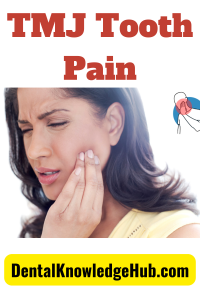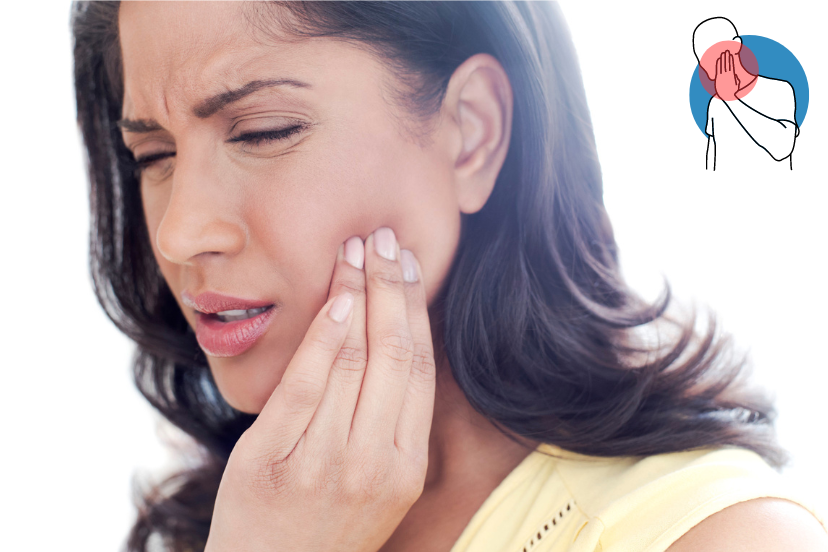TMJ Tooth Pain
Causes, Symptoms, Treatment And Prevention
As a dental health researcher and advisor, I understand the discomfort and frustration that can come with TMJ tooth pain. Temporomandibular Joint (TMJ) disorders can affect the jaw joint and surrounding muscles, leading to various symptoms, including tooth pain. This article will explore the causes, symptoms, treatment options, home remedies, and prevention tips for TMJ tooth pain. By understanding this condition better, you can take proactive steps to manage and alleviate discomfort.
Introduction To TMJ (Temporomandibular Joint) Tooth Pain
The temporomandibular joint is the joint that connects your jawbone to your skull, allowing you to open and close your mouth smoothly. TMJ disorders refer to a group of conditions that cause pain and dysfunction in this joint. One common symptom of TMJ disorders is tooth pain, which can be quite bothersome and affect your daily life.
What Causes TMJ Tooth Pain?
Several factors can contribute to TMJ tooth pain. Understanding these causes can help you identify the root of the problem and seek appropriate treatment. Some common causes include:
Misalignment Of The Jaw
When the jaw joint is misaligned, it can put pressure on the surrounding tissues, leading to tooth pain. Misalignment may occur due to factors like genetics, trauma, or poor dental work.
Bruxism (Teeth Grinding)
Bruxism, or teeth grinding, can exert excessive force on the jaw joint and teeth, resulting in tooth pain. This habit often occurs during sleep or as a response to stress and anxiety.
Stress And Anxiety
High levels of stress and anxiety can lead to jaw clenching and teeth grinding, contributing to TMJ tooth pain. Emotional tension can trigger muscle tension, affecting the jaw joint and surrounding areas.
Arthritis
Certain types of arthritis, such as osteoarthritis or rheumatoid arthritis, can affect the temporomandibular joint, causing inflammation and tooth pain. Arthritic conditions may develop over time or result from other underlying health issues.
Recognizing The Symptoms
Recognizing the symptoms of TMJ tooth pain is crucial for early detection and effective management. Here are some common symptoms to watch out for:
Jaw Pain And Tenderness
TMJ tooth pain often manifests as discomfort, tenderness, or aching sensations in the jaw joint. This pain may be more noticeable while chewing or talking.
Headaches And Migraines
Headaches, including migraines, can accompany TMJ pain. The pain may radiate from the jaw to the temples, forehead, or back of the head.
Earaches
TMJ disorders can cause earaches that are often misdiagnosed as ear infections. The pain may occur in one or both ears and can be intermittent or constant.
Tooth Sensitivity
TMJ tooth pain may lead to tooth sensitivity, making it uncomfortable to bite down or consume hot or cold foods. This sensitivity is often unrelated to dental issues like cavities or gum disease.
Diagnosis Of TMJ Tooth Pain
If you suspect TMJ pain, seeking a professional diagnosis from a dentist or oral health specialist is essential. They will perform a thorough examination and consider your symptoms. The diagnosis may involve the following:
Dental Examination
The dentist will examine your teeth and jaw joint, looking for signs of misalignment, teeth grinding, or other dental issues that may contribute to your tooth pain.
X-Rays And Imaging Tests
X-rays or other imaging tests may be taken to get a closer look at the jaw joint and surrounding structures. This can help identify any abnormalities or signs of arthritis.
TMJ Arthroscopy
In some cases, a TMJ arthroscopy may be recommended to examine the joint more closely. This minimally invasive procedure involves inserting a small camera into the joint to assess its condition.
Treatment Options For TMJ Tooth Pain
The treatment approach for TMJ tooth pain depends on the severity of your symptoms and the underlying causes. Here are some common treatment options that your dentist or healthcare provider may suggest:
Lifestyle Changes And Self-Care
Making specific lifestyle changes can significantly improve TMJ tooth pain. These may include avoiding hard and chewy foods, practicing stress management techniques, and applying heat or cold packs to the affected area.
Dental Treatments
Dental treatments for TMJ tooth pain can include orthodontic interventions, such as braces or splints, to realign the jaw and reduce pressure on the joint. In some cases, dental restorations may be necessary to correct dental issues that contribute to the pain.
Medications
Pain relievers, anti-inflammatory drugs, and muscle relaxants can be prescribed to manage the pain and reduce inflammation associated with TMJ pain. However, medication alone is typically not a long-term solution and is often combined with other treatments.
Physical Therapy
Physical therapy exercises can help improve jaw mobility, reduce muscle tension, and enhance the stability of the temporomandibular joint. A physical therapist may guide you through exercises specifically designed to address your TMJ pain.
Home Remedies For TMJ Tooth Pain Relief
In addition to professional treatment, there are several home remedies that can provide temporary relief from TMJ pain. These remedies may help alleviate discomfort and promote relaxation of the jaw muscles. Here are some suggestions:
Applying Heat Or Cold Packs
Applying a warm compress or ice pack to the affected area can help reduce inflammation and ease muscle tension. Experiment with both heat and cold to determine which provides the most relief for your TMJ pain.
Eating Soft Foods
Consuming soft foods that require less chewing can minimize the strain on your jaw joint, providing some relief from TMJ pain. Opt for foods like soups, smoothies, mashed potatoes, or yogurt until your symptoms improve.
Practicing Relaxation Techniques
Engaging in relaxation techniques, such as deep breathing exercises, meditation, or yoga, can help reduce stress and tension in your jaw muscles. This, in turn, may alleviate TMJ pain.
Avoiding Excessive Jaw Movements
Limit activities that require excessive jaw movements, such as chewing gum or biting into hard objects. Giving your jaw joint time to rest can aid in the healing process and prevent further aggravation of your symptoms.
Prevention Tips For TMJ Tooth Pain
While it may not be possible to prevent all cases of TMJ pain, you can take steps to minimize your risk and manage the condition. Consider the following prevention tips:
Maintaining Good Oral Hygiene
Practicing proper oral hygiene, including regular brushing, flossing, and dental check-ups, can help prevent dental issues that may contribute to TMJ pain.
Avoiding Hard And Chewy Foods
Minimize your intake of hard and chewy foods that require excessive force to bite down. Opt for softer alternatives to reduce strain on your jaw joint.
Managing Stress Levels
Since stress and anxiety can contribute to TMJ pain, finding healthy ways to manage stress is crucial. Engage in activities that help you relax, such as exercise, hobbies, or spending time with loved ones.
Using Mouth Guards For Teeth Grinding
If you grind your teeth during sleep, using a mouth guard can help protect your teeth and alleviate pressure on the jaw joint. Consult your dentist to have a custom-fitted mouth guard made for you.
When To Seek Professional Help
While home remedies and lifestyle adjustments can provide relief for mild cases of TMJ tooth pain, it is essential to seek professional help if your symptoms persist or worsen. Additionally, consider contacting a healthcare professional if you experience difficulty opening or closing your mouth, severe pain, or other concerning symptoms.
Conclusion
TMJ tooth pain can significantly impact your quality of life, but you can find relief with the right knowledge and management strategies. This article has explored the causes, symptoms, diagnosis, treatment options, home remedies, and prevention tips for TMJ pain. Early detection and appropriate care are key to effectively managing this condition. You can minimize discomfort and improve your overall dental health by incorporating professional advice and making necessary lifestyle adjustments.
Frequently Asked Questions (FAQs)
1. Can TMJ tooth pain go away on its own?
In some cases, mild TMJ pain may resolve on its own with lifestyle changes and home remedies. However, if the pain persists or worsens, it is advisable to seek professional help.
2. Can stress really cause TMJ tooth pain?
Yes, high-stress levels and anxiety can lead to jaw clenching and teeth grinding, which are common contributors to TMJ pain.
3. How long does it take to recover from TMJ tooth pain?
The recovery time for TMJ pain varies depending on the severity of the condition and the chosen treatment options. It can range from a few weeks to several months.
4. Can I do any exercises at home to alleviate TMJ tooth pain?
Yes, there are specific exercises that can help relieve TMJ pain. Consult with a physical therapist or dentist to learn exercises tailored to your condition.
5. Can TMJ tooth pain affect both sides of the jaw?
Yes, TMJ pain can affect one or both sides of the jaw, depending on the underlying causes and the extent of the condition.





